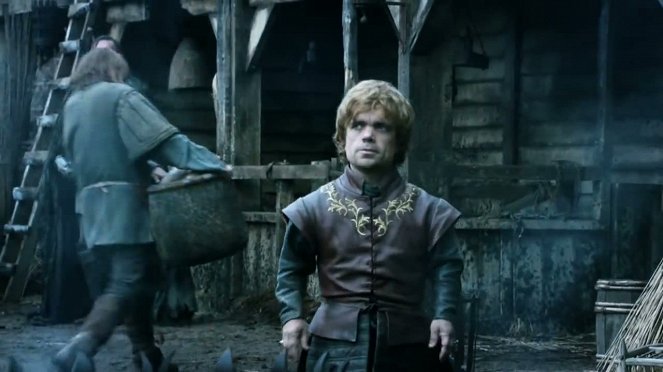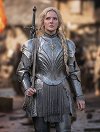Zeneszerző:
Ramin DjawadiSzereplők:
Peter Dinklage, Lena Headey, Kit Harington, Emilia Clarke, Sophie Turner, Maisie Williams, Iain Glen, Nikolaj Coster-Waldau, John Bradley, Alfie Allen (több)Streaming (1)
Évad(8) / Epizódok(73)
Tartalmak(1)
Az HBO® monumentális új sorozata, amely George R.R. Martin kirobbanó sikerű regénysorozata, A tűz és jég dala alapján készült, olyan világban játszódik, ahol a nyarak évtizedeket ölelhetnek át, a telek pedig akár egy emberéleten át is tarthatnak. Az ármánykodó déltől és a barbár keleti földektől kezdve a jeges északig és az ősi Falig, amely a mindent elnyelő titokzatos sötétségtől védi a birodalmat, a Hét Királyság nagy hatalmú családjai vívnak egymással harcot a Vastrón megszerzéséért. Fondorlat és árulás. Nemesség és becsület. Hódítás és győzelem. A Trónok harcában diadalmaskodsz vagy meghalsz. (Pro Video Film)
(több)Videók (293)
Recenziók (11)
The biggest television phenomenon of the 2010s. From an inconspicuous whisper announcing a spectacle for all fantasy lovers, for whom The Lord of the Rings was a great fairy tale, through the growing hype welcoming each new episode as a mercy – to the eighth season, which even the most die-hard opponents couldn't escape. Game of Thrones was everywhere and even after the last episode, which, as expected, divided viewers into several camps, I gladly admit that its fame was well deserved. The intricate world of Westeros captivated me from the opening scene; from the finale of the first season, I wanted to know everything about the Seven Kingdoms, and despite various stumbling blocks, this journey fascinated me until the bittersweet end. Just as Martin's book source material has its weak points, so does the adaptation, logically. In its early years, it clung to the books desperately, focusing on intimacy and saving the grand moments. Later on, it accentuated storylines that received considerable attention in the books but never added any resolutions, and eventually began trimming them down somewhat insensitively. In the seventh and eighth seasons, in territory where the source material has not yet ventured (and in my opinion, nothing will change that due to the increasingly egotistical nature of the vain author), it shifts three gears up and manages in one episode to have multiple plot twists we would normally have to wait years for. Yet I find it somewhat amusing how spoiled the audience is, currently with dozens of new works being offered every month, and yet almost dissatisfied every time. Whether it's dragged out or rushed, floods of complainers are heard every time, as no variant suits their taste. While I don't completely agree with a daring stage for the main events at all costs, the obvious emphasis on viewer inaccessibility on HBO, or the cruel and sudden fates of characters whose motivations were thoroughly developed over many years, this world still fascinated me even a decent few years later, and I even prefer its television mutation to the literary one. It may not be half as elaborate, and it almost parasitizes literature at the very end, but unlike A Feast for Crows or A Dance with Dragons, I don't feel like its authors are just teasing me with an avalanche of side characters and endlessly drawn-out storylines (see Dorne – a testing stone for both versions). And those unforgettable characters, whom I grew fond of and who have forever become part of pop culture (Daenerys, Missandei, Jon, and Robb being my favorites). The world of power intrigues, where battles, love, conflicts, dragons, the undead, and revelations from the worlds of ice and fire increasingly took root, may not have offered me the ending I dreamt of, not even its restrained version which I expected. And unlike others, I can let go of these endings and accept the one offered by D.B. Weiss and David Benioff, even though they are foxes in sheep's clothing, and I won't kid myself that they didn't mock us viewers several times as the end approached by alternating obvious fan service with underlining all expectations. Each season had plenty of unforgettable moments, clashes, encounters, and plot twists, so despite various disappointments, I am staying with the highest rating even at the very end. Valar Morghulis and farewell.
()
(kevesebbet)
(több)
No offense, this game of being a rough and different fantasy is mostly about the fact that among all the possible clichés, both directing and story, there is a lot of sex from behind, talking dirty and every now and then someone takes a piss. Otherwise, in the first two episodes, there is a lot of talk, but it does not in any way create interest in the mythology of the fictional world in a person unfamiliar with the book (which is quite a problem when it comes to fantasy). The characters are fine, some of them are absolutely great (especially the decadent dwarf Tyrion), but I kind of found out over time that I don't really care much about what happens to them next. What I miss are the explicitly ballbusting and charming scenes, something that would set this series apart beyond excretion and intercourse. I'm not in the mood to watch the next episode, which is quite a problem for an HBO series.
()
The first season was a struggle. There’s so much empty dialogue, scheming that goes nowhere and raw fucking that it makes you tired. But as the episodes and seasons progress, you begin to marvel at the thoughtful interconnectedness of the individual fates, how everything fits together with surgical precision, how G.R.R. Martin, or rather the showrunners, are not afraid to shock and allow themselves the least predictable (and yet logical) twists that make your jaw drop, your back shiver, and all you can do is utter an involuntary "Bugger me!". The manner in which the fates of Arya, Sansa, Tyrion (and I could go on) unfold in the least predictable ways brings joy to the hearts of viewers who enjoy rich stories. A real viewer's delight that builds to a fantastic fourth season, and I really have no idea what they're going to top it with in the upcoming one. And the fact that the series has an unprecedented, by TV standards, large-scale set design, sets and atmosphere, where every thoughtfully invested dollar of the generous budget is evident, only confirms the quality of this exceptional achievement.
()
Without the need to vomit out a commentary full of either glorification or dirt after the first episode, I watched this third season of Rome in peace and quiet. True, the sunny amphitheaters have been replaced by the cool atmosphere of massive castles, but the characters remain. The beautifully ambiguous, non-black and white, well-detailed, and superbly acted characters, once again reinforce the belief that even when guns are blazing in a series (film), there may not necessarily be a battle because there are always enough grey eminences, schemers, and related coincidences that can shift the plot in a different way than we expect. If there is anything not worth praising, it is the direction of the last two episodes because the first one lacks proper gradation and the final one lacks a stronger epilogue resonance. When it's no longer in fashion at the library to take out Martin's books and there’s no queue for them at the bookstore, I'll drop by. I’m really intrigued by this world. [PS: My personal sympathies go out to Ser Jorah and Arya Stark, and now that list also includes Tyrion Lannister since the beginning of the second season.]
()
The War of the Roses and goings-on on the Apennine Peninsula under the Borgias in fantasy garb in the shape of a saga for which the label “fantasy" is too restrictive, even if it didn’t seem so to begin with. Nobody with spiky ears, no dwarves, orcs or similar critters. But we do get numerous living, non black-and-white characters (primarily Claudio... um Tyrion, who is head and shoulders above the rest) and politicians. Tons and tons of politics and tons and tons of intrigues, plotting and scheming and, somewhere in the background and sort of “by the way", epic battles that are more spoken about than taken part in; and it is no mistake that the best passages in the book are the “purges" à la Tyrion’s chapter four of “Clash of Kings". That applies to the book. Look for the bearer of the torch lit by Waltari and Graves rather than a variation on Lord of the Rings or the current unending list of generic sagas. That’s why it’s good that HBO took this under its wing, because this IS (and will be) like their Rome with a fantasy backdrop. Simply an adaptation in the form of a series which, despite not matching the image formed inside my head over many years (it isn’t made for fans of the books, but mainly for viewers without an opinion and so mainly it should be able to stand alone by itself as a series in itself; which HBO is managing so far), I find thrilling because the creators avoided following the books religiously and are not afraid of cutting to the quick, even though sometimes it’s a little too hurried and they don’t let some situations sink in properly. They often use theatrical approaches instead of regular cinema language (that only comes with the arrival of Alan Taylor and season two). Which certainly is not a criticism, just an observation. And this is a typical HBO series in the way that separate episodes don’t work too well alone, but only as part of a whole. A prime example is the finale of season one and the opening episode of season two. In each there are so many storylines that each gets their “minute under the spotlight", but there is so much of it that the result is disjointed, with a little bit of everything, which ends up being a little bit of nothing. But if you take them as part of the whole, everything suddenly seems right because, as we know, HBO simply doesn’t work in terms of seasons. For them, the start of a new season is “just" another chapter of one story; and you can tell apart separate seasons only on the basis of their constantly growing (and already high) production value. Although the creators like do it their way (from season two on I would describe it as loosely inspired by “Game of Thrones", rather than an adaptation of “Game of Thrones"), in spirit they remain faithful to the book. And what does being faithful to the book mean in the case of Game of Thrones? This doesn’t mean sticking at all costs to the wealth of stories and twists; these are not so important, can be changed, shortened, combined etc., but being faithful to the characters. The creators often follow different routes than the book’s author, but they follow them to the same destination. Which, in view of their exceptional qualities, characterization and development, I think speaks for itself. | S1: 5/5 | S2: 4/5 | S3: 4/5 | S4: 5/5 | S5: 4/5 | S6: 4/5 | S7: 4/5 | S8: 3/5 |
()
(kevesebbet)
(több)






